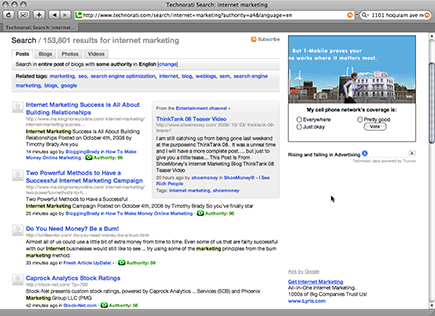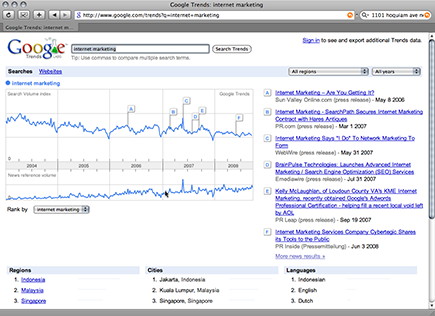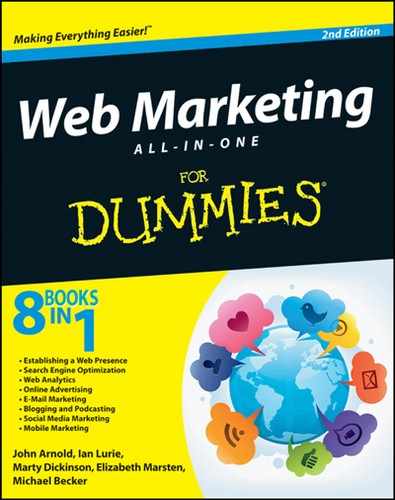Chapter 1: Picking Your Blog Topic
In This Chapter
![]() Finding a blog topic you care about
Finding a blog topic you care about
![]() Creating goals for your blog
Creating goals for your blog
![]() Calculating the size of your audience
Calculating the size of your audience
Folks seem to think that blogging is a magical concept. But blogs aren’t mystical. A blog is simply a toolset with which you write and publish entries (posts), and then visitors can comment on those posts. It’s all about the content, you see.
To have a blog — and use it for web marketing — you need a solid topic up front. Choose something about which you’re passionate and knowledgeable. That way, you can build a base of followers, which in turn drives traffic to your site (or sites) — and ultimately, your endeavor.
Choosing a Blog Topic
If you’re going to write a blog, you need a topic: a focus. Without one, you’ll have a tough time attracting an audience. Your goal is to reach the point where your audience seeks you out because you consistently offer information that they find helpful in light of their interests.
Picking that topic can be tougher than you might think. Common questions and concerns that you may have include
I don’t want to pick a narrow topic. I’ll be stuck writing about it forever.
No wants want to hear what I have to say.
My topic is so boring. Why would anyone read it?
I can’t think of anything.
All the preceding questions translate to one issue: fear. We’re all trained to be terrified of writing. Starting in grade school, we’re told that we’ll lose two points for a missing comma or four points for an incomplete sentence, and we’ll flunk the class if we use than when we should use then.
Well, you can let go of that fear now. Blogging is the best form of writing therapy on the planet. People read blogs for content, not for grammatical perfection. Of course, you should strive to write grammatically correct language lest your readers think that you’re not well educated or that your work is sloppy in general. But one misplaced punctuation mark doesn’t mean that you get an F.
And, if you hate writing, you can do a blog that’s a series of videos. (More about that in the next few chapters.)
Before you read the rest of this chapter, just relax. Take a breath. Smile. You’re among friends.
• Write about something that excites you.
• Write about something you know.
You’re probably thinking, “But I’m doing this to grow my business!” If you’re blogging for your business, you should be enthusiastic about it, too.
Think about it, and find the one or two or many things you care about in your career. For example, if you’re a passionate collector of bottle tops, that’s your blog topic. If you’re an Internet marketer and truly care about the profession, write about it.
• Blogging requires a long-term commitment. You can more easily write regularly on a topic in which you’re interested. And, you can more easily write regularly if you know a lot about the subject material.
• Your audience won’t hesitate to point out subject matter mistakes. That’s not a big deal: Mistakes happen. But make sure that you’re right more often than not. Knowing the topic is important.
• Your audience knows if you’re not passionate. You won’t attract as many dedicated readers.
• It’s no fun if you write about a topic with which you’re unfamiliar. Writing about a familiar topic is much more fun than struggling to write about an unfamiliar topic.
Consider what you do, and then ask yourself these questions:
• How can I make this topic funny?
• How can I make this topic fascinating?
• What can I say about this topic that will prompt discussion?
• Which questions are asked repeatedly?
• If you sell cash registers, you could blog about the coolest-looking cash registers.
• If you’re a management consultant, write a blog about applying your favorite time-management technique to midsize companies.
• If you’re a roofer, create a question-and-answer blog for homeowners.
• If you’re a real estate agent, blog about your favorite staging techniques.
• If you’re a chef, write about the best frozen foods with taste testing.
• If you’re a teacher, come up with a daily list of homework tips.
You have dozens of possibilities. Never start by telling yourself, “What I do is boring.” It’s not!
Thinking about Your Blog Goals
After you decide on a topic, determine what you’re trying to achieve by writing this blog. When you answer, keep the following concepts in mind:
• Few blogs succeed in the first six months of life. Whatever your goal is, give yourself at least 6 to 12 months to reach it.
• For the first six months, you almost certainly will “speak to an empty room.”
• Only a handful of blogs generate appreciable direct income through advertising or other cash generators. Most are marketing tools with indirect benefits for your business.
Set a six-month goal for your blossoming blog. Consider the following goals as a starting point:
• Answer the top 20 questions asked by customers.
• Write 42 posts.
• Send 20 potential clients to read the blog.
• Find two potential clients on the web.
If you’re feeling truly ambitious, strive for these results:
• Use your blog to write a book.
• Sign up at least 300 subscribers.
• Get at least half your traffic from search engines.
All these goals are attainable and provide a substantial boost for your business.
Bad goals include
• Earn a five-figure income.
• Rank No. 1 for a competitive phrase in the search engines.
These two goals, although attainable, are quite difficult to reach. Plus, they don’t necessarily help your business. Earning $10,000 from your blog, for example, doesn’t help if you spend the equivalent of $20,000 worth of your time to do it. And, ranking No. 1 for a relevant phrase might help, but you need to do a lot of research first. See Book II for more on search engine optimization (SEO).
Sizing Up Your Space
After you pick a blog topic and create goals for your blog, it’s time to figure out who else is writing about your topic and how big your audience might be.
Using Technorati
Technorati.com is a blog search engine. When you visit it and search for your topic, you find a list of blogs written about your subject or a related topic. Even better, you see them ranked according to the number of other blogs linking to each of the listed blogs.
Figure 1-1 shows all the blogs that include internet marketing.
Figure 1-1: A Technorati search result.

Using Google Trends
Google Trends shows you changes in search volume for different terms over time. Using this information is a good way to figure out whether your blog topic is on the upswing.
Visit www.google.com/trends and search for a key phrase. You see changes over time in both search volume and news references, as shown in Figure 1-2.
If you see the message Not Enough Search Volume as a result, it doesn’t mean that your topic is never searched. It only means that people haven’t searched for the phrase the number of times (potentially thousands) that are required to show up in Google Trends.
If a phrase does show up in Trends, though, you know it’s very, very hot — and it’s worth pursuing the topic.
Figure 1-2: Use Google Trends to see changes in search volume.

Using search engines
Go to your favorite search engine and search for your chosen topic. Use the Blog Search option, if your search engine has one. Google Blog Search is shown in Figure 1-3.
Figure 1-3: Google Blog Search.

Check for the following:
• How many other bloggers write about your topic? If you find millions, you may have a hard time standing out.
• What do other bloggers say about your topic? You might have a valuable counterpoint.
• Can you fill any gaps in their knowledge?
• What kinds of comments do those bloggers get? Comments can give you insight into unanswered questions that you can respond to.
The key here is to figure out where you can offer the most value to readers. That’s your opportunity to turn your blog into a valuable marketing platform.



